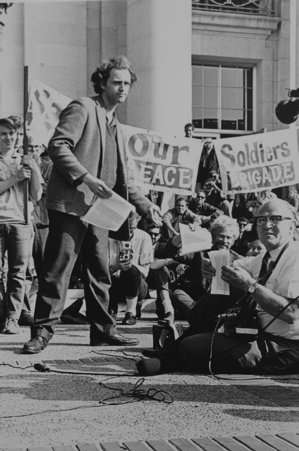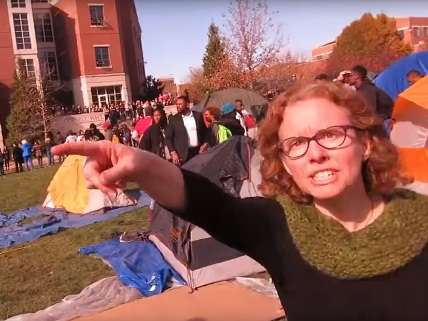Free Speech Breaks Out at Univ. of Minnesota, Kansas, Elsewhere
Extreme political correctness is (finally) sparking a reaction that places free expression as "the bedrock" upon which higher education rests.

Free speech is finding new defenders among faculty on college campuses. This is heartening, if more than a little overdue (it's also more than a little sad that universities have taken so long to defend the freedom of expression and inquiry that makes them possible in the first place).
In a forceful commencement address delivered over the weekend at Rutgers, President Barack Obama called out students there for disinviting former Secretary of State Condoleeza Rice from speaking at graduation a couple of years ago. While there's no question that the Obama administration, via its Department of Education and its Office of Civil Rights, has given social-justice warriors unprecedented tools by which to suppress speech on campuses, he lectured "snowflakes" to toughen up already. "If somebody's got a bad or offensive idea, prove it wrong," he said. "Engage it, debate it, stand up for what you believe in. Don't be scared to take somebody on. Don't feel like you got to shut your ears because you're too fragile and somebody might offend your sensibilities."
More important than the words of an outgoing (and hypocritical) president are the actions of faculty themselves. Kansas University (KU) professors are pulling together a "free speech policy" that characterizes unfettered expression as the "bedrock upon which academic freedom and the pursuit of knowledge are based."
"As KU works to improve its climate of equity and inclusion, the university must commit to protecting our right to free speech, regardless of how offensive, uncivil or disagreeable such communication might be to members of our community."
In March, the "consultative committee" of the University of Minnesota's faculty senate passed a two-page statement of principles, which states in part
University of Minnesota Board of Regents policy guarantees the freedom "to speak or write as a public citizen without institutional restraint or discipline." The protection of free speech, like the related protection of academic freedom, is intended "to generate a setting in which free and vigorous inquiry is embraced in the pursuit of 'the advancement of learning and the search for truth,' in the words emblazoned on the front of Northrop Auditorium." Ideas are the lifeblood of a free society and universities are its beating heart. If freedom of speech is undermined on a university campus, it is not safe anywhere. The University of Minnesota resolves that the freedom of speech is, and will always be, safe at this institution.

As important, the faculty senate is pushing a series of recommendations, still at the draft stage, that include a commitment to "vigorously protect free speech when serious disruption is anticipated or actually occurs." According to Inside Higher Education, Minnesota's faculty moved into action after various campus protests, including one by Muslim and non-Muslim students and faculty who objected to a panel on free speech that used a Charlie Hebdo cover in its advertising for the event. Dale Carpenter, a professor at Minnesota Law School, explains that the students and faculty need to understand that it's not that
"speech can never be regulated, but that it can't be regulated in the interest of trying to elevate some topics over others." Libel, slander, harassment and threats are all no gos, for example, he said, but conversations can't be shut down because they're offensive or even hurtful to some.
As Minnesota's faculty nears voting on its commitment to free speech as "bedrock," schools ranging from University of Chicago to Purdue to Princeton have recently issued official statements from faculty or university administrators about the centrality of free speech and open debate, especially on controversial topics. Read more about here.
Reason TV sat down with Greg Lukianoff, who fights for free speech on campus as the head of The Foundation for Individual Rights (FIRE), to talk about what he thinks is the most-chilling recent development at universities: Students who demand administrators silence speech. Lukianoff, who also appears in Can We Take a Joke?, a new documentary about stand-up comedy and campus political correctness, says that until a few years ago, it was usually residence-life types and school bureaucrats who were leading the charge against First Amendment rights. Lately, though, the most outrageous and vociferous demands are coming from students themselves. Watch now or go here.
